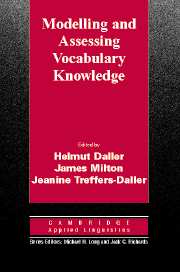Book contents
- Frontmatter
- Contents
- List of contributors
- List of abbreviations
- Acknowledgements
- Foreword
- Series Editors' Preface
- Editors' introduction
- I Fundamental issues
- II Vocabulary and learner differences
- III The unit of assessment and multiple vocabulary measures
- IV Metaphors and measures in vocabulary knowledge
- Chapter 9 Implementing graph theory approaches to the exploration of density and structure in L1 and L2 word association networks
- Chapter 10 Insights into the structure of L1 and L2 vocabulary networks: intimations of small worlds
- V Vocabulary measures in use
- References
- Appendices
- Index
Chapter 9 - Implementing graph theory approaches to the exploration of density and structure in L1 and L2 word association networks
Published online by Cambridge University Press: 04 May 2010
- Frontmatter
- Contents
- List of contributors
- List of abbreviations
- Acknowledgements
- Foreword
- Series Editors' Preface
- Editors' introduction
- I Fundamental issues
- II Vocabulary and learner differences
- III The unit of assessment and multiple vocabulary measures
- IV Metaphors and measures in vocabulary knowledge
- Chapter 9 Implementing graph theory approaches to the exploration of density and structure in L1 and L2 word association networks
- Chapter 10 Insights into the structure of L1 and L2 vocabulary networks: intimations of small worlds
- V Vocabulary measures in use
- References
- Appendices
- Index
Summary
Introduction
The work described in this chapter grows out of a concern to explore the power and appropriacy of one of the most persistent and pervasive of the metaphors used in vocabulary research, that of the lexical network. Our attempts to investigate the network metaphor have led us to apply the principles of graph theory to word association data in order to compare the relative density and structure of L1 and L2 vocabularies. This chapter will briefly describe the background to this research and then report the findings of a new empirical study based on a graph theoretical approach. Our discussion and analysis of this work will focus in particular on one central issue raised by Nation in his overview of vocabulary models and measures in the opening chapter: the question of learner attitude in any form of vocabulary testing.
Any field of study that deals with things that we cannot directly observe is obliged to rely heavily on metaphors to describe and probe those phenomena. Research into the mental lexicon is no exception. Yet very often the ‘metaphors we live by’ in vocabulary research (to borrow Lakoff and Johnson's 1980 formulation) are so much part of the field's furniture that we no longer see them for what they are. We forget that they, and all the implications they bring with them, are only approximations to the phenomena we are seeking to capture and do not in fact translate any empirically verifiable reality.
- Type
- Chapter
- Information
- Modelling and Assessing Vocabulary Knowledge , pp. 167 - 181Publisher: Cambridge University PressPrint publication year: 2007
- 8
- Cited by

